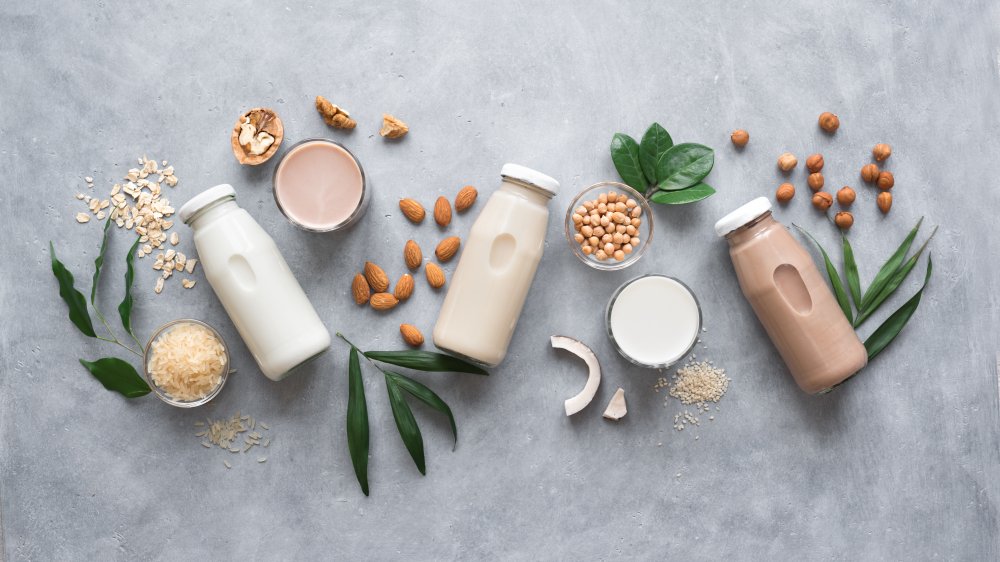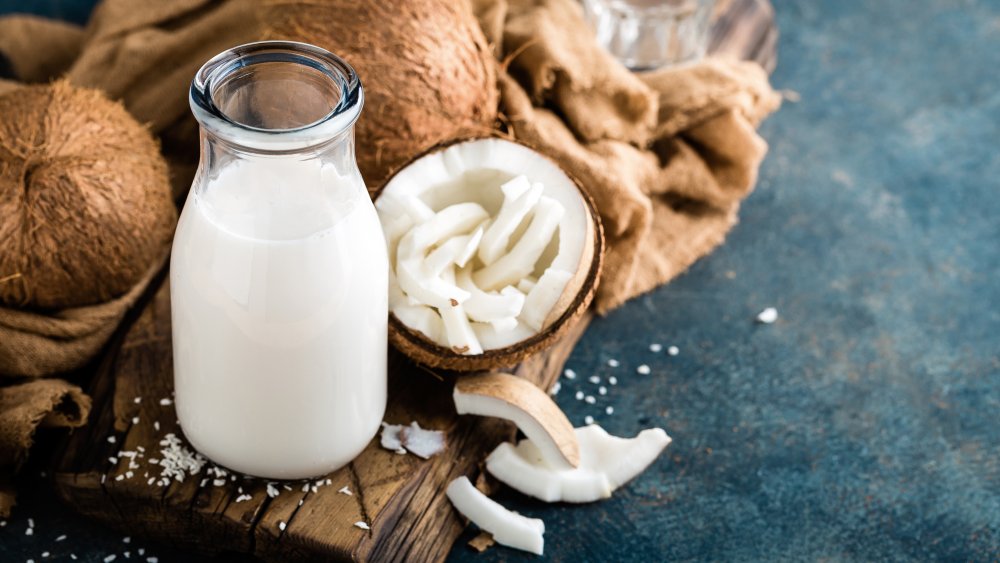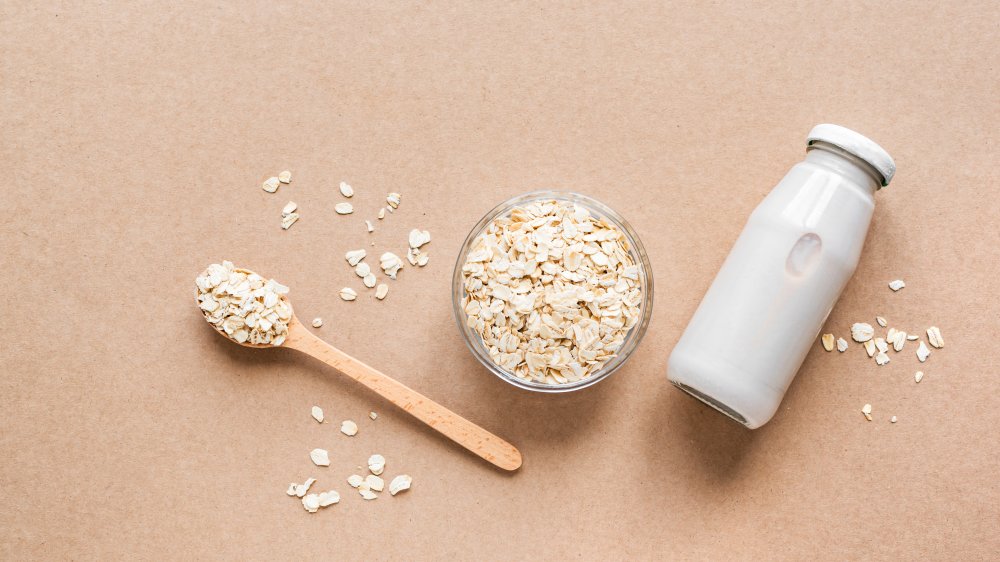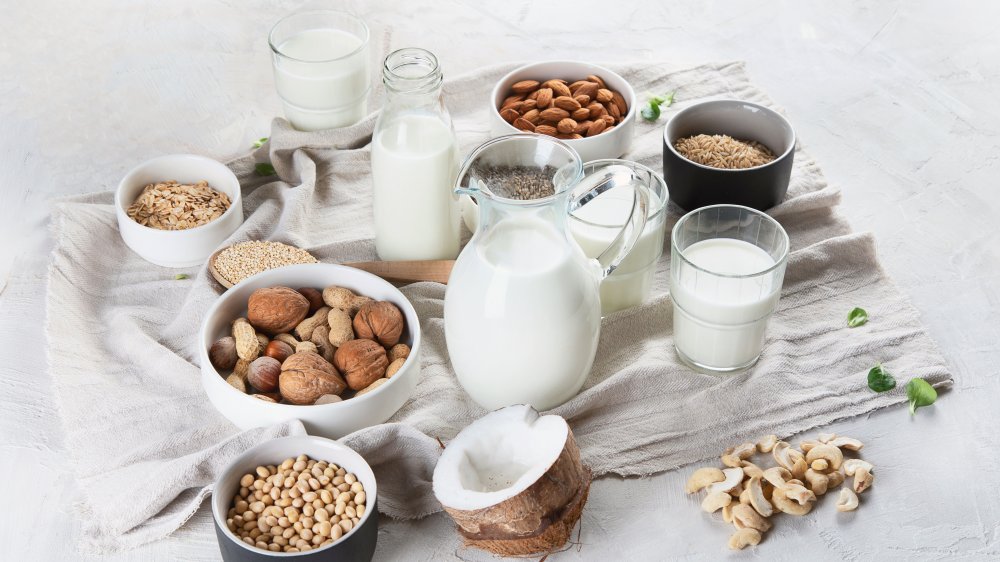The Truth About Plant-Based Milks
The term "plant-based" seems to be everywhere — on milk cartons, butters, snacks, and more. Responding to a growing demand for items that don't use animal products, companies witnessed an 8.1 percent increase in sales of plant-based foods in 2017 alone, according to The Washington Post. Plant-based milks are among the most popular non-dairy items that are currently flying off shelves. Favorite plant-based milk varieties include options like almond, hemp, oat, and coconut. But with different flavors, textures, and nutrient densities, many struggle with which to choose.
Almond milk came out as an early frontrunner in the race to replace cow's milk. Relatively low in calories with high levels of nutrients, it offers a smooth taste that many swear by for cereals, baking needs, and more. Since almonds contain a healthy amount of Vitamin E, a natural antioxidant, its milk form follows suit, Healthline notes. According to the outlet, almond milk can supply nearly 20-50 percent of your daily needs for this vitamin, depending on the brand. Helpful in combating inflammation, stress, and even cancer cells, Vitamin E is definitely a nutrient you want to absorb enough of.
Furthermore, this milk type offers rich supplies of Vitamin D, potassium, and calcium without the lactose that many struggle to digest properly. Just make sure to steer clear of sweetened varieties and check the label to see what preservatives have been added. If you're looking for the most natural choice for almond milk, you can make your own, as well.
Coconut milk may offer less nutrients than you think
Another plant-based fan-favorite comes from the coconut variety. When you're at the store, you may notice "coconut milk beverage" plastered on the label of various cartons. But real, full-fat coconut milk often comes in a can and offers a large amount of healthy fats that many other milks don't contain. Plus, coconut milk only contains one gram of carbs per serving, Women's Health explains. The saturated fat content is what has people concerned, however. "The science isn't there yet to say that coconut is a good saturated fat. While it may be better than the type in animal products, we're not sure yet," registered dietician Julieanna Hever tells the outlet.
Coconut milk offers small amounts of iron and calcium, as well, but make sure to avoid buying this type of milk in cans that contain BPA. BPA lining is linked to thyroid issues and other health risks, WebMD notes. Nonetheless, coconut milk may be best for plant-based cooking. Since it's better to ingest in small amounts, coconut milk can thicken up different dishes and add more flavor as needed. Plus, you can even add it to your bath for skin-softening luxury.
Some good news and bad news for oat milk lovers
Oat milk has recently taken center stage as the number one plant-based milk of choice. With velvety smoothness and rich flavor, who can blame the people who love it so much? Oat milk is made from blended oats and water, then it goes through a few rounds of straining. Oats themselves are packed with fiber, Vitamin B, iron, calcium, magnesium, and protein, Good Housekeeping notes. Plus, they contain prebiotics and beta-glucan. But it's unclear whether or not the cholesterol-lowering beta-glucan molecules translate into oat's liquid form.
This milk alternative provides a higher amount of protein than almond, cashew, coconut, and rice milk, since most of these contain little to none, Health explains. If you find a carton fortified with Vitamin D and calcium, it will help up your stores of these vital nutrients, as well. However, oat milk has more calories than other unsweetened plant-based milks, which can be negligible depending on the amount that you're drinking.
It's also important to note that, like other non-dairy options, the nutrition label may contain a list of preservatives, salts, sugars, and fillers along with the oat content. When you're looking for oat or any other plant-based milks, organic and unsweetened will likely offer your best bet. Just remember that this type of plant-based milk can contain the most sugar if you aren't careful. As always, make sure to read the label to find the cleanest ingredients possible.
Hemp milk comes packed with vitamins
Feeling run down and low on nutrients can happen sometimes, particularly if you're following a plant-based diet and aren't getting everything that your body needs to function properly. Hemp milk can offer a valuable alternative that boosts your energy stores and helps you feel your best. Hemp milk comes from the seed of the hemp plant, which is also used to make marijuana. But don't worry, Healthline notes that the THC content is negligible, so you won't notice anything out of the ordinary.
With a creamy flavor, hemp milk provides omega-3 fatty acids along with calcium and Vitamin D when you purchase the fortified versions (via SELF). Additionally, this milk option packs healthy fats and protein — plus, it's extremely easy on digestion, per Healthline. The same protein that makes it easy to digest is actually one of the few complete plant-based proteins that you can find. According to Healthline, that means it contains all of the essential amino acids humans need to function. Some benefits may include improved skin health and heart disease prevention. However, just like other varieties, be wary of added sugars and preservatives that can negate the plentiful benefits of this milk.
With so many options and countless nutrients, plant-based milk is here to stay — making us healthier and less dependent upon animal products one carton at a time.



